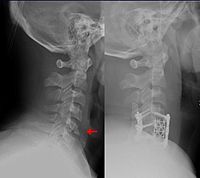
Risk factors for intraoperative greater trochanteric fractures in hemiarthroplasty for intracapsular femoral neck fractures
Sign Up to like & getrecommendations! Published in 2020 at "European Journal of Trauma and Emergency Surgery"
DOI: 10.1007/s00068-020-01549-0
Abstract: Hemiarthroplasty is widely accepted as the treatment of choice in elderly patients with a displaced intracapsular femoral neck fracture. Intraoperative greater trochanteric fractures thwart this successful procedure, resulting in prolonged recovery, inferior outcome, and increased… read more here.
Keywords: risk; fracture; intracapsular femoral; trochanteric fractures ... See more keywords

Use of a Trochanteric Fixation Nail-Advanced (TFNA) with cement augmentation for treatment of trochanteric fractures in patients greater than sixty five years of age
Sign Up to like & getrecommendations! Published in 2022 at "International Orthopaedics"
DOI: 10.1007/s00264-021-05282-0
Abstract: Purpose Intramedullary nailing is the standard treatment of trochanteric fractures. Mechanical failure such as cut-out and cut-through are associated with high rates of revision surgery, functional impairment, and mortality. The aim of the study was… read more here.
Keywords: age; cement; treatment trochanteric; fixation ... See more keywords

Intramedullary nails versus sliding hip screws for AO/OTA 31-A2 trochanteric fractures in adults: A meta-analysis.
Sign Up to like & getrecommendations! Published in 2017 at "International journal of surgery"
DOI: 10.1016/j.ijsu.2017.05.042
Abstract: OBJECTIVES The optimum treatment with intramedullary nails (IMN) or sliding hip screws (SHS) for type 31-A2 trochanteric fractures remains controversial. Therefore, we performed a meta-analysis of randomized controlled trials (RCTs) to compare IMN with SHS… read more here.
Keywords: ota trochanteric; sliding hip; intramedullary nails; trochanteric fractures ... See more keywords

Fracture morphology of AO/OTA 31-A trochanteric fractures: A 3D CT study with an emphasis on coronal fragments.
Sign Up to like & getrecommendations! Published in 2017 at "Injury"
DOI: 10.1016/j.injury.2016.12.015
Abstract: AIMS This study was designed to assess the incidence and morphology of coronal plane fragments in AO/OTA 31-A trochanteric fractures. PATIENTS AND METHODS 156 cases of AO/OTA 31-A trochanteric fractures were retrospectively evaluated. Lateral radiographs… read more here.
Keywords: ota trochanteric; morphology; coronal fragments; trochanteric fractures ... See more keywords

Screw versus helical proximal femoral nail in the treatment of unstable trochanteric fractures in the elderly.
Sign Up to like & getrecommendations! Published in 2019 at "Journal of clinical orthopaedics and trauma"
DOI: 10.1016/j.jcot.2018.07.012
Abstract: Purpose Comparison of clinical, radiological and functional outcomes of screw proximal femoral nail (PFN) and helical PFN in management of unstable trochanteric fractures. Methods This prospective randomised comparative study included 60 patients with closed unstable… read more here.
Keywords: trochanteric fractures; pfn group; unstable trochanteric; pfn ... See more keywords

Tip-apex distance and other predictors of outcome in cephalomedullary nailing of unstable trochanteric fractures.
Sign Up to like & getrecommendations! Published in 2019 at "Journal of clinical orthopaedics and trauma"
DOI: 10.1016/j.jcot.2019.04.018
Abstract: Background Cephalomedullary nails are presently the gold standard in management of unstable trochanteric fractures. The tip-apex distance (TAD) is one of the most important factors that determines success or failure of fixation, but was described… read more here.
Keywords: trochanteric fractures; unstable trochanteric; apex distance; cephalomedullary nails ... See more keywords

The incidence and management of Isolated Greater Trochanteric Fractures - A systematic review of 166 cases.
Sign Up to like & getrecommendations! Published in 2021 at "Journal of clinical orthopaedics and trauma"
DOI: 10.1016/j.jcot.2021.101537
Abstract: Background Isolated fractures of the greater trochanter are unusual injuries with a wide spectrum of presentation, investigations and management strategies. Aims The objective of this study was to evaluate the incidence and treatment protocols used… read more here.
Keywords: isolated greater; management; review; management isolated ... See more keywords

Implants for trochanteric fractures in Norway: the role of the trochanteric stabilizing plate—a study on 20,902 fractures from the Norwegian hip fracture register 2011–2017
Sign Up to like & getrecommendations! Published in 2021 at "Journal of Orthopaedic Surgery and Research"
DOI: 10.1186/s13018-020-02163-x
Abstract: Background The trochanteric stabilizing plate (TSP) is used as an adjunct to the sliding hip screw (SHS) in unstable trochanteric and subtrochanteric fractures. We wanted to describe the choice of implant for trochanteric fractures with… read more here.
Keywords: hip; fracture; stabilizing plate; tsp ... See more keywords

Increased failure rates after the introduction of the TFNA proximal femoral nail for trochanteric fractures: implant related or learning curve effect?
Sign Up to like & getrecommendations! Published in 2022 at "Acta orthopaedica"
DOI: 10.2340/17453674.2022.1410
Abstract: Background and purpose - Trochanteric fractures are often treated using intramedullary fixation. In our institution, the TFN-Advanced Proximal Femoral Nailing System (TFNA) was introduced as replacement for the Gamma Trochanteric Nail (GTN3) for the treatment… read more here.
Keywords: trochanteric fractures; failure; nail; learning curve ... See more keywords

Proposal and validation of a new classification for trochanteric fractures based on medial buttress and lateral cortical integrity
Sign Up to like & getrecommendations! Published in 2023 at "Frontiers in Surgery"
DOI: 10.3389/fsurg.2023.1044941
Abstract: Background Trochanteric fractures usually require surgical treatment. The currently used classification system, such as AO classification, cannot cover all variant types, and is poor in reliability, causing confusion in surgical decision making. This study describes… read more here.
Keywords: agreement; classification; new classification; trochanteric fractures ... See more keywords